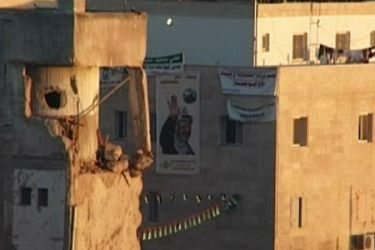
The last days of Yasser Arafat
The journalist who secured the last interview with the Palestinian leader talks to Witness.
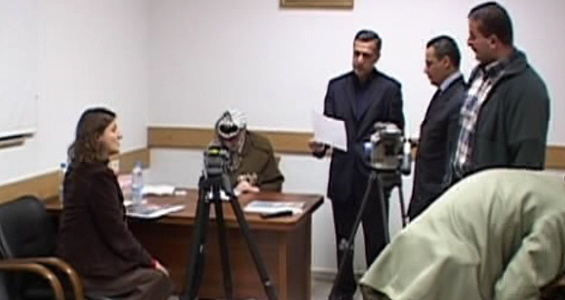 |
| Sherine Salama did not know then that hers would be the last interview Arafat gave |
By late 2003, Yasser Arafat, the iconic Palestinian leader, had been effectively imprisoned in his Ramallah compound for almost a year.
To Sherine Salama, an Australian journalist, this represented a challenge and she set herself the task of making a definitive documentary about the Palestinian leader – but it would not prove easy.
It took her over a year of filming in and around Arafat’s compound before she finally managed to persuade Arafat’s aides to arrange an interview.
It would be the last interview Arafat ever gave. A month later he was dead.
The last days of Yasser Arafat tells the final chapter in the story of one of the most controversial public figures of recent times.
In the following account, Sherine Salama explains how she managed to secure the last interview with the Palestinian president.
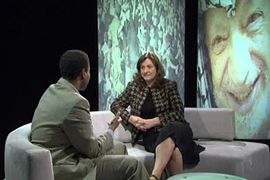 |
| Sherine Salama describes how she managed to secure an interview with Yasser Arafat |
For many years I travelled between Australia and Palestine, but Yasser Arafat, the Palestinian leader, had never figured greatly in my life.
Then in September 2003, I woke up in the middle of the night convinced that he was about to die.
Just a week later, the Israeli government threatened to assassinate him.
I had a feeling that this was a story that needed to be told and I soon found myself traveling to Arafat’s compound in Ramallah.
The last time I was in the compound I was training Palestinian journalists. One of my former students, Mohammed, was now working for a major news agency and he offered to help me secure an interview with Arafat.
He introduced me to the president’s right-hand man, Nabil Abu Rudeinah.
Abu Rudeinah told me that apart from press conferences, Arafat rarely gave interviews but that he would try to convince him of the idea, and that in the meantime, as I was only visiting for a week, I should “eat Baba Ganouj in Ramallah and sweet pastries in Nablus”.
Arafat’s compound had been attacked three times by Israeli forces and every building apart from the one housing Arafat had been blown up.
For Palestinians the compound became a symbol of resistance and while I was there, Palestinians would gather at it to show their solidarity with the man they called Abu Ammar.
| In Video |
|
|
|
Sherine Salama on The last days of Yasser Arafat |
More Witness videos… |
I had always had mixed feelings about Arafat, but could not help being swept up by the euphoria of the moment.
I was moved by his obvious love for his people and by their love for him.
Arafat had devoted his entire life to putting Palestine on the map. For these people he was a father figure, the only leader they had ever known.
One of the main reasons why I wanted to make this film was to highlight the contrast between the image of Arafat as a world leader – a man who had led his nation for 40 years – and the reality of his plight during his last days.
The fact that his compound was destroyed around him and that he was essentially held captive in his headquarters was a great metaphor for the whole situation in the Palestinian territories.
Arafat was the supreme survivor; he had survived many battles and countless assassination attempts, his instincts ensuring that he had outlived most of his comrades.
But at 74-years-old and in poor health, life in the compound was taking its toll.
But now he is 74 years old and in feral health. And life in a compound is taking its toll.
After waiting a week with no word from Abu Rudeinah, I tried to approach him but other journalists were also desperate to ingratiate themselves with Arafat’s right-hand man and, when I finally spoke to him, he told me not to hold my breath.
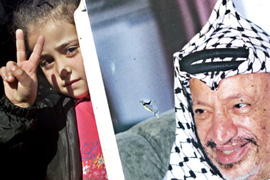 |
| Arafat preserved Palestinian national identity even without statehood [GALLO/GETTY] |
It seemed his minders were reluctant to have him answer questions from the media – or little-known filmmakers.
“We can’t arrange it, we don’t have time … If you are waiting here you waste your time, you can do something else until we find time for you … If we succeed to arrange with the president to have this meeting, we will do … Next step, just if we have time, I call you back”, Ali Sawafta, Arafat’s press secretary, told me.
He went on: “Some people have been waiting for a month, others came from Greece and went back empty-handed. Others from Australia may also return without an interview.”
Arafat seemed further away than ever so I decided to change my strategy and to start looking for help from anybody with access to the president.
I tracked down Abu Nizar, a senior member of the Fatah central committee, Nabil Shaf, the foreign minister who just happened to live upstairs from me, and Ahmed Saber, the deputy minister of information, whose enthusiasm hardly filled me with confidence.
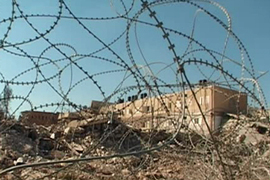 |
| Arafat had been effectively imprisoned in his Ramallah compound for almost a year |
A week had turned into a month and I was beginning to feel frustrated.
But the following evening just as I returned to the compound, I was told that I was on standby for an interview and soon after that was able to meet and interview the man himself.
I did not know it then, but I had just filmed the last interview Yasser Arafat would ever give.
Fifteen days later I heard a rumour that he had collapsed.
What has happened in the Palestinian Territories since his death is heartbreaking and I think a lot of people have missed him. He single-handedly gave the Palestinians an identity and put them on the map.
The last days of Yasser Arafat can be seen from Tuesday, November 10, at the following times GMT: Tuesday: 0830 and 1900; Wednesday: 0330, 1400 and 2330.